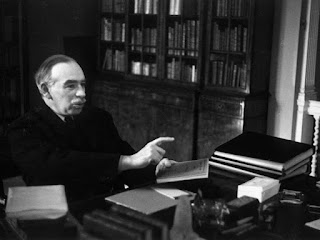New working paper by Tom Palley. From the abstract:Keynes' General Theory was a massive step forward relative to classical economics, but it was also a step backward in its denial of the conflictual nature of capitalism. There is need to understand Keynes' technical contributions regarding the workings of monetary economies, but also need to understand the flaws within his thinking and the consequences thereof. Keynes made a fundamental contribution elucidating the mechanism of effective demand, and he also has claim to be the preeminent monetary theorist. However, owing to his denial of conflict, he had a flawed view of capitalism which is why establishment Keynesianism struggles to explain contemporary stagnation. That flawed view also undermines the case for Social Democracy. Contrary
Topics:
Matias Vernengo considers the following as important: Class Conflict, General Theory, Income distribution, Keynes, Neoliberalism, Palley
This could be interesting, too:
Nick Falvo writes Homelessness planning during COVID
Matias Vernengo writes Paul Davidson (1930-2024) and Post Keynesian Economics
Lars Pålsson Syll writes The Road Not Taken
Matias Vernengo writes Podcast with about the never ending crisis in Argentina
New working paper by Tom Palley. From the abstract:
Keynes' General Theory was a massive step forward relative to classical economics, but it was also a step backward in its denial of the conflictual nature of capitalism. There is need to understand Keynes' technical contributions regarding the workings of monetary economies, but also need to understand the flaws within his thinking and the consequences thereof. Keynes made a fundamental contribution elucidating the mechanism of effective demand, and he also has claim to be the preeminent monetary theorist. However, owing to his denial of conflict, he had a flawed view of capitalism which is why establishment Keynesianism struggles to explain contemporary stagnation. That flawed view also undermines the case for Social Democracy. Contrary to conventional wisdom, his view of capitalism is supportive of Neoliberalism and Keynes can be viewed as a compassionate (Third Way) Neoliberal.
In some ways this is the argument in Geoff Mann's In the Long Run We Are All Dead. I think one way of thinking about it is that Keynes' effective demand as a critique of marginalist (neoclassical) economics needs to be completed by old classical (political economy) ideas, which put the class conflict at the center of analysis. That of course is necessary for a policy break with neoliberalism.

